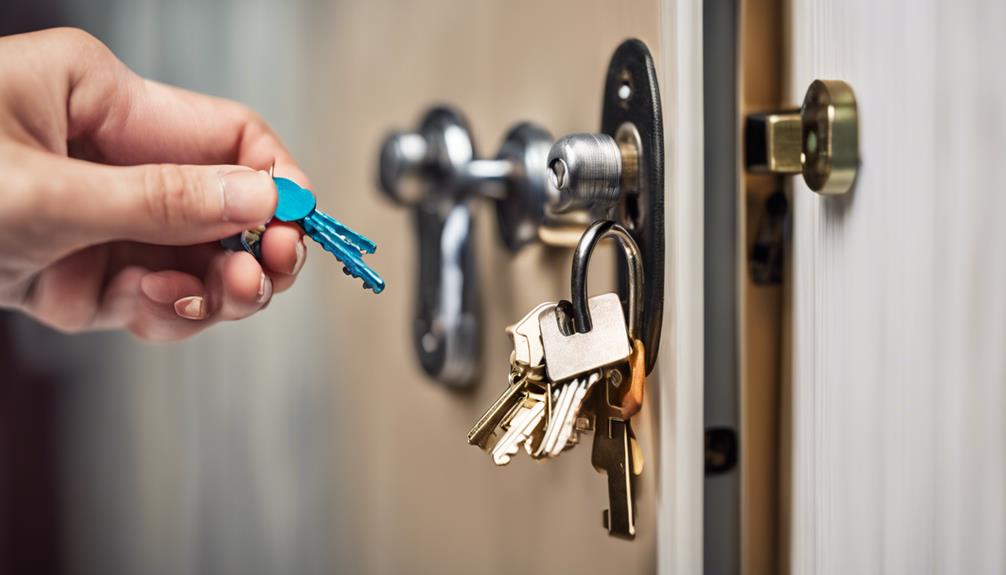You should re-key locks in your rental properties after any tenant leaves. This guarantees security for the new tenant and mitigates risks associated with previous tenants possibly retaining keys. If you've experienced lost keys or suspect unauthorized access, it's time to act. Additionally, it's wise to re-key if a tenant exhibited problematic behavior or if you've had a change in property management. Legal obligations may also require you to re-key after a tenant's departure. If you want to learn about the steps and factors influencing this important decision, you might find the following information useful.
Key Takeaways
- Re-key locks after each tenant move-out to ensure security for new occupants and eliminate uncertainty about previous key holders.
- Consider re-keying if a previous tenant exhibited problematic behavior or if lost keys were reported, raising security concerns.
- Regularly re-key locks if multiple keys were issued to previous tenants or if signs of wear and tear are observed.
- Comply with local laws, which may require changing locks after a tenant departs to maintain safety standards.
- Establish a policy for periodic re-keying to enhance overall security and trust in landlord-tenant relationships.
Importance of Re-keying Locks
When it comes to a landlord's responsibility, re-keying locks is vital for guaranteeing tenant safety and security. You want your tenants to feel safe in their homes, and that starts with secure access.
Rekeying rental property locks not only protects your tenants but also enhances the overall rental property security. Understanding the legal implications of re-keying locks is significant for both landlords and tenants and can help prevent potential disputes.
Imagine a new tenant moving in, unaware of who might still have keys to their home. This can be unsettling. By promptly rekeying locks, you eliminate that uncertainty and provide peace of mind. It shows your commitment to their safety and builds trust in your landlord-tenant relationship.
Additionally, landlord rekeying locks after a tenant moves out is a proactive approach to maintaining security for future tenants. You want to make certain that no former occupants or unauthorized individuals have access.
Regularly rekeying locks demonstrates your dedication to maintaining a secure environment, which can be a significant selling point for potential renters.
In the end, prioritizing rekeying locks reflects your responsibility as a landlord and your genuine care for tenant safety. It's a simple yet effective way to foster a secure living space for everyone involved.
Signs It's Time to Re-key
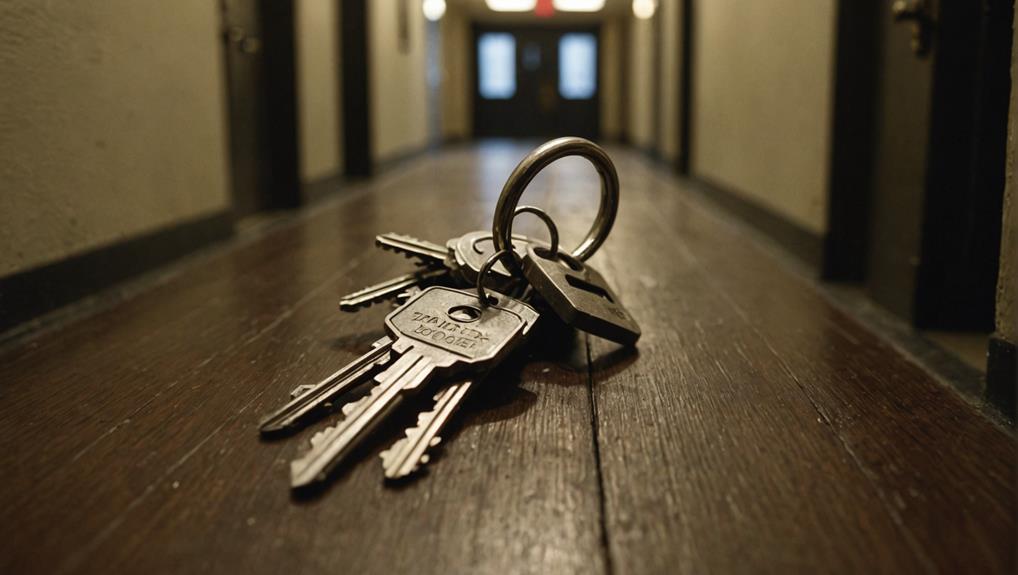
When a tenant moves out, it's essential to think about re-keying your locks to maintain the security of your rental property.
According to state laws regarding re-keying, landlords may have legal obligations to change locks after a tenant vacates.
If you've had a lost key incident, that's another strong sign it's time for a change.
Keeping your property secure should always be a top priority.
Recent Tenant Move-Out
Security should always be a priority for landlords, especially after a recent tenant move-out.
When a tenant leaves, it's crucial to reflect on rekeying rental units to guarantee the safety of your property and future tenants. You never know how many copies of keys might be floating around after a tenant vacates.
Here are some signs it's time to take action:
- Previous Tenant's Behavior: If the tenant had a turbulent history or expressed dissatisfaction, it's wise to rekey.
- New Tenant Arrives Soon: With quick tenant turnover, rekeying helps you maintain a secure environment for the new occupant.
- Lost Keys: Even if keys were returned, there's always a chance they were lost or duplicated.
Lost Key Incident
A lost key incident can raise immediate concerns about the safety of your rental property. When a tenant reports a lost key, it's crucial to assess the situation quickly. You want to guarantee the well-being of your tenants while also protecting your investment.
Here are some signs that it's time to re-key your locks:
| Situation | Action Needed | Rationale |
|---|---|---|
| Tenant loses a key | Re-key immediately | Prevent unauthorized access |
| Multiple keys issued | Re-key to limit access | Confirm only current tenants have keys |
| Key found by someone else | Re-key without delay | Protect tenant safety and privacy |
| Tenant moves out | Re-key as a standard practice | Secure property for new tenants |
Legal Requirements for Landlords
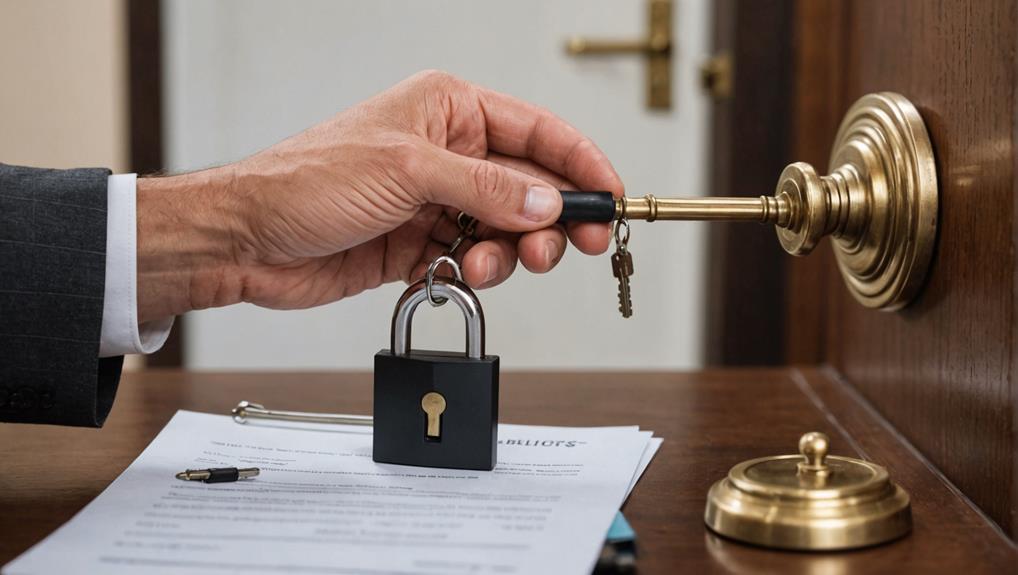
Understanding the legal requirements for landlords is essential for maintaining a safe and compliant rental property. This includes being aware of landlord responsibilities regarding locks and guaranteeing that your property meets local safety codes, which may include proper locks and security measures.
Not only does this protect your tenants, but it also shields you from potential legal issues. Here are some key points to keep in mind:
- Safety Standards: You must guarantee that your property meets local safety codes, which may include proper locks and security measures.
- Tenant Rights: Familiarize yourself with tenant rights regarding privacy and security. This means respecting their space and giving appropriate notice before entering.
- Lease Agreements: Clearly outline your policies regarding locks and keys in the lease agreement. This transparency helps prevent misunderstandings.
Steps to Re-key Locks
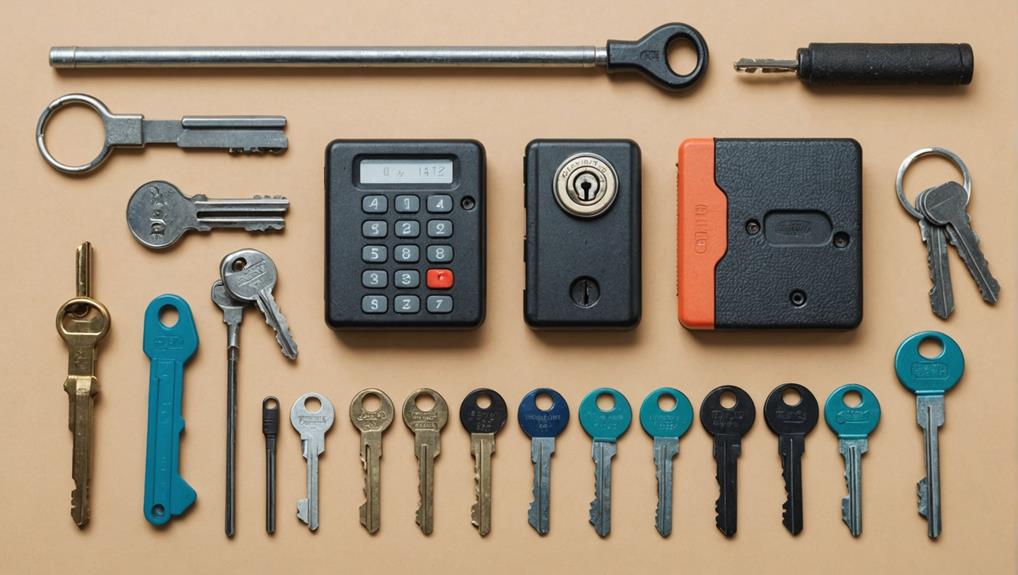
When it comes to re-keying locks in your rental property, following a clear and efficient process is essential for maintaining tenant safety and property security.
Start by gathering the necessary tools, including a re-keying kit specific to your lock brand, a screwdriver, and a flashlight.
Next, remove the lock from the door. Use your screwdriver to unscrew the lock mechanism carefully. Once you've got the lock in hand, insert the current key and turn it to the open position. This allows you to access the cylinder and the pins inside.
Now, replace the old pins with new ones that come with your re-keying kit. Make sure to follow the kit's instructions closely, as each lock may have specific requirements.
After replacing the pins, reassemble the lock and test it with the new key to verify it works smoothly.
Choosing a Professional Locksmith
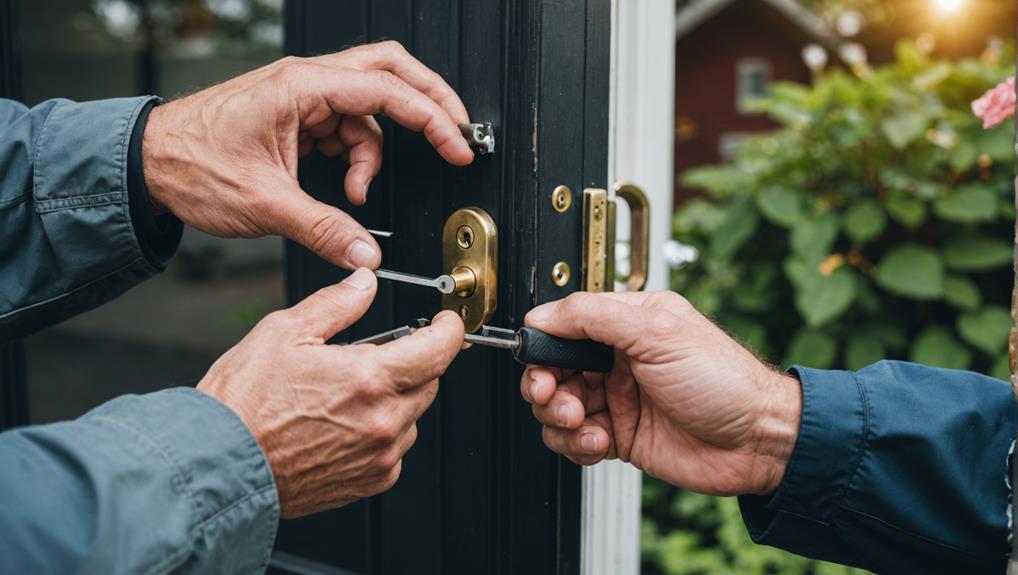
When to Re-key Locks in Rental Properties
Choosing a Professional Locksmith
Re-keying locks can be a straightforward task, but sometimes it's best to leave it to the professionals. Choosing a reputable locksmith guarantees that the job is done right and helps maintain the security of your rental property.
Here are a few key considerations when selecting a locksmith:
– Experience and Expertise: Look for someone with a solid track record in re-keying locks. Experienced locksmiths are more likely to handle various types of locks and security systems effectively.
Additionally, consider asking if they've specialized training or certifications, as this can enhance their skills further. For more guidance, refer to essential tips for choosing a reliable locksmith.
- Licensing and Insurance: Always verify that the locksmith holds the necessary licenses and insurance. This protects you from potential liabilities and guarantees you're working with a qualified professional.
- Customer Reviews: Check online reviews or ask for references. Positive feedback from previous clients can give you confidence in your choice and help you gauge the locksmith's reliability.
Cost Considerations for Re-keying
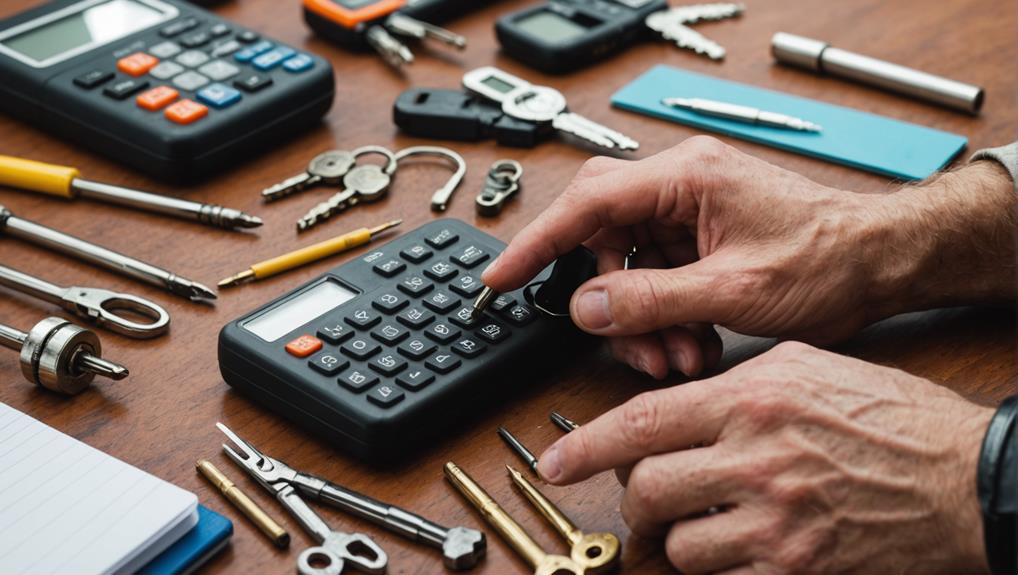
Before diving into the cost of re-keying locks, it's important to contemplate several factors that can influence the overall expense. First, consider the type of locks you have. Standard pin tumbler locks are generally cheaper to re-key than high-security locks, which often require specialized tools and expertise.
Additionally, understanding lock re-keying costs can help you make informed decisions about your budget.
Next, think about the number of locks that need re-keying. If you have multiple properties or several locks in one property, bulk pricing might come into play, helping you save some cash.
Don't forget about labor costs. Hiring a professional locksmith can vary in price based on your location and the locksmith's experience. While it might be tempting to DIY, remember that improper re-keying can lead to security issues down the line.
Lastly, factor in any additional services you might need, like replacing old locks or adding new ones. Your investment in re-keying is ultimately about ensuring the safety and security of your tenants.
Frequently Asked Questions
Can Tenants Request Lock Re-Keying During Their Lease?
Yes, tenants can request lock re-keying during their lease, especially if they feel their security's compromised.
If you're a tenant, it's best to communicate your concerns to your landlord or property manager. They'll appreciate your proactive approach to safety.
However, keep in mind that the decision ultimately rests with them, so be prepared for a discussion about the request and any potential costs involved.
Open communication always helps!
How Often Should Landlords Consider Re-Keying for New Tenants?
If you're running a tight ship, you should consider re-keying your locks every time a new tenant moves in.
It's an essential step to guarantee everyone's safety and peace of mind. Not only does it protect your property, but it also shows you care about your tenants' security.
Regularly re-keying locks helps maintain trust and creates a welcoming atmosphere where tenants feel valued.
Are There DIY Options for Re-Keying Locks?
Yes, there are DIY options for re-keying locks that can save you time and money.
You can purchase a re-keying kit specific to your lock brand, which usually includes detailed instructions.
Start by removing the lock from the door, then follow the kit's steps to change the pins inside.
It's a straightforward process, and with a little patience, you can guarantee your locks are secure and tailored to your needs.
What Types of Locks Can Be Re-Keyed?
Imagine a symphony of security, where each lock plays its part in safeguarding your space.
You'll find that most pin tumbler locks can be re-keyed, including standard door locks and deadbolts. Smart locks often offer this feature too, allowing you to adjust access with a few taps.
Even some mortise locks can be re-keyed, giving you flexibility in your security choices.
Does Re-Keying Affect Renters' Insurance Policies?
Re-keying locks typically doesn't affect renters' insurance policies directly, but it's wise to check with your insurance provider.
If you change the locks to enhance security, it could potentially lower your risk profile, which may lead to better rates.
Always inform your insurer about significant changes to your property for clarity.
Keeping them updated guarantees you have the right coverage and peace of mind while you focus on creating a safe living space.
Conclusion
In the world of rental properties, you might think keeping the same old locks is just fine—after all, they haven't failed you yet, right? But imagine the irony of trusting your property to strangers with your keys still floating around! By re-keying, you not only protect your investment but also sleep soundly, knowing that you've got the upper hand. So don't wait for a break-in; take charge and re-key those locks before it becomes a regrettable afterthought!

